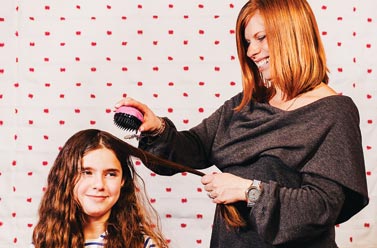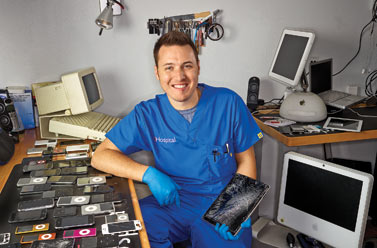How to Profit From Your Passion
See how these entrepreneurs were able to achieve small business success.
Profit and prosper with the best of Kiplinger's advice on investing, taxes, retirement, personal finance and much more. Delivered daily. Enter your email in the box and click Sign Me Up.
You are now subscribed
Your newsletter sign-up was successful
Want to add more newsletters?

Delivered daily
Kiplinger Today
Profit and prosper with the best of Kiplinger's advice on investing, taxes, retirement, personal finance and much more delivered daily. Smart money moves start here.

Sent five days a week
Kiplinger A Step Ahead
Get practical help to make better financial decisions in your everyday life, from spending to savings on top deals.

Delivered daily
Kiplinger Closing Bell
Get today's biggest financial and investing headlines delivered to your inbox every day the U.S. stock market is open.

Sent twice a week
Kiplinger Adviser Intel
Financial pros across the country share best practices and fresh tactics to preserve and grow your wealth.

Delivered weekly
Kiplinger Tax Tips
Trim your federal and state tax bills with practical tax-planning and tax-cutting strategies.

Sent twice a week
Kiplinger Retirement Tips
Your twice-a-week guide to planning and enjoying a financially secure and richly rewarding retirement

Sent bimonthly.
Kiplinger Adviser Angle
Insights for advisers, wealth managers and other financial professionals.

Sent twice a week
Kiplinger Investing Weekly
Your twice-a-week roundup of promising stocks, funds, companies and industries you should consider, ones you should avoid, and why.

Sent weekly for six weeks
Kiplinger Invest for Retirement
Your step-by-step six-part series on how to invest for retirement, from devising a successful strategy to exactly which investments to choose.
Jan Koum moved to the U.S. from Ukraine when he was 16 and went to work for Yahoo when he was 21. By the time he was 33, he was living off savings and working to perfect his brainchild, an instant messaging service. Five years later, WhatsApp fetched $19 billion from Facebook.

Eric Silverstein, owner, Peached Tortilla Matthew Mahon/Redux
Silverstein spent a year developing a business plan for a restaurant, but he couldn’t find a bank that was willing to lend him money. After talking with his sister in Los Angeles, which has a lively food-truck scene, he started looking into getting a truck of his own. “It was fascinating to me in terms of a business model,” he says. “It was a low-cost way to get your feet wet and get your brand out there.”
From just $107.88 $24.99 for Kiplinger Personal Finance
Become a smarter, better informed investor. Subscribe from just $107.88 $24.99, plus get up to 4 Special Issues

Sign up for Kiplinger’s Free Newsletters
Profit and prosper with the best of expert advice on investing, taxes, retirement, personal finance and more - straight to your e-mail.
Profit and prosper with the best of expert advice - straight to your e-mail.
Silverstein decided to launch his food-truck business in Austin, Tex., which boasts more than 300 sunny days a year and an affluent, growing population. To start the business, he raised $40,000, primarily from family and friends. He spent about $12,000 to lease and decorate his truck, train employees, buy food and create a Web site. The Peached Tortilla—the name is an homage to the time he spent in the Peach State—opened for business in September 2010. Silverstein used the rest of the money for operating capital during the first three months, when the business lost about $20,000. He lived off $30,000 he had saved while he was a lawyer, and he didn’t take a salary until last year.
Silverstein’s menu, which includes Chinese barbecue, pad thai and a Japanese-influenced burger, got good reviews in the local media, but the work was grueling. “This is a business that takes a physical toll,” he says. “I was out scrubbing the truck at 5 a.m., and I’d come home too exhausted to do anything. Emotionally, it was the worst year of my life.” He considered quitting but couldn’t bear the thought of telling his investors, some of whom he had known for 20 years or more.
In time, things got better. Last year, the Peached Tortilla was featured as one of the country’s top ten food trucks on the daytime talk show Live! With Kelly and Michael. In 2012, Restaurant Hospitality magazine named Silverstein in a special feature, “Stars of Street Food.” Silverstein now has 12 full-time and five part-time employees, two food trucks and a catering business. In 2013, revenues were $850,000, and he expects to take in more than $1.2 million this year.
With a new round of investment capital, Silverstein plans to realize his longtime dream to open a Peached Tortilla restaurant this fall. He doesn’t plan to abandon his food trucks, but he’s convinced that a brick-and-mortar business, combined with catering, is the key to long-term growth.
“I’m not happy with a million-dollar business,” Silverstein says. “I want a multimillion-dollar business.”
[page break]
Growing a landscaping business
Craig Jenkins-Sutton’s love of gardening and landscape design dates back to his childhood in central Minnesota. His grandfather was a farmer, and both of his grandmothers had vegetable gardens. His father was director of a youth camp, and Jenkins-Sutton helped with a variety of chores, from building cabins to plumbing.

After graduating from college, Jenkins-Sutton worked at a series of commercial landscaping jobs, but the work, planting trees around parking lots, didn’t allow for much creativity. And that wasn’t the only problem. “I’m a horrible employee,” he says. “I’m too opinionated. I have to be in charge.”
Jenkins-Sutton, 43, realized that his true passion was designing gardens and landscapes for homeowners. “Because it’s their personal space, they want more” than commercial clients do, he says. Residential landscaping also offered him the opportunity to deploy all of his skills, from planting vegetables to building garden sheds.
Jenkins-Sutton decided to launch Topiarius in Chicago, which has a vibrant landscaping market. Chicago lawns are small and summers are short, but homeowners there take great pride in their green spaces, Jenkins-Sutton says. His wife, Sara, 41, found a human-resources job, which provided a regular income and health insurance. Jenkins-Sutton also had seed money he earned from selling a home in Massachusetts that he and a friend had built on spec.
Jenkins-Sutton’s goal was to provide a service that was more personal and creative than the “mow-and-blow guys” who worked out of their pickup trucks. He started advertising in the spring of 2003 but received only a handful of responses. “That first year, I would have a week of projects and a week of trying to figure out what would be next,” he says.
Gradually, though, word got around, and the company began to build a list of regular clients. In 2005, Jenkins-Sutton bought a new truck and Sara joined the company full-time. In the spring of 2007, they added Topiarius Floral Design, which installs and cares for flowers and plants inside homes and businesses.
The collapse of the housing market forced them to rethink the way they did business. Before 2008, a large segment of the company’s customers lived in middle-income neighborhoods. “People were taking out $20,000 home-equity lines of credit to redo their backyards,” Jenkins-Sutton says. “Then the recession hit.”
They shifted their focus to Chicago’s affluent neighborhoods, such as Lincoln Park and the Gold Coast. To attract business from condo and townhouse owners, the company marketed its rooftop-garden designs and customized containers. Those types of “above ground” projects now account for about 80% of the company’s business.
In 2010, the couple hired a consultant to help them expand the business. They rented office space on the west side of the city and hired more workers. Revenue in 2013 was $1.5 million, up from about $800,000 in 2010.
The housing recovery has led to more calls from outlying neighborhoods. And it’s a lot easier for the company to market its business now than in 2003. In addition to its Web site, Topiarius has an active Facebook presence and a Pinterest page that displays a portfolio of its work.

[page break]
Solving a knotty problem
Rikki Mor swore that, after growing up with chopped-off hair that made people think she was a boy, she would never give her daughters short haircuts unless they asked for them. So when her twin girls, Maya and Yarden, grew heads of thick, curly hair, she spent hundreds of dollars trying out detangling products. “Brushing your child’s hair can start the morning or evening off in an unpleasant way,” says Mor, 40. She knew that she wasn’t the only parent with the problem, and she took note of which brushes worked and which didn’t.

In 2008, Mor, who lives in Denver, met with an engineer who helped her design the Knot Genie, a brush with bristles that vary in length and bend in a way that detangles with minimal stress to hair. The bristles have no balls at the tip, which were standard on the brushes she had used and snagged in her kids’ hair. For better control, she also eliminated the handle (though a version with a handle is now available). Mor searched for a manufacturer and settled on one overseas. Once she was satisfied with a prototype, in 2009, Mor placed an order for 10,000 brushes.
At first, Mor kept her full-time job as a claims specialist for Nationwide Insurance and ran the hairbrush business on the side from her home, all while raising the twins, now 13, and younger daughter Tali, 9. Mor and her husband put about $60,000 of their savings into Knot Genie. “We decided to limit the funding so that if we lost it all, we could still put food on the table,” she says. “We did a lot of grass-roots efforts, trying to find bloggers and other people who we thought could influence our niche audience.” They plowed revenues back into the business, and sales grew through word of mouth and some fortunate encounters. For example, a correspondent for the Today Show came across the brush and featured it in a segment on new children’s products.
In 2012, Mor left her job to focus on Knot Genie full-time. She has more than ten independent contractors, including sales representatives and a liaison who helps her work with manufacturers. She sells her brushes at www.knotgeniestore.com for $15 to $23 as well as through about 3,500 salons, beauty-supply stores and boutiques (some stores also sell the brush on Amazon.com). Revenues topped $1 million in 2013.
Launching a business has come with some lessons. For example, the second set of 10,000 brushes that Mor ordered were duds, “with bristles like spaghetti noodles,” she says. “I didn’t have a plan of recourse that allowed me to get the money back.” That’s when she hired a manufacturer liaison.
Mor is convinced that many consumers are still discovering detangling products, providing Knot Genie with plenty of room to grow. She projects revenue growth of 30% to 50% for 2014, and in the next five years she hopes to reach revenues of $10 million annually. More products, designed with the motto “life detangled” in mind, are in the works, and she hopes to launch some of them by the end of the year.

[page break]
Doctoring broken apple products
When an Apple device stops working, its owner usually wants to fix the problem stat. That may be why Ross Newman’s iHospital has taken off. Technicians at the repair shop for Apple products wear medical scrubs and mend broken devices behind a glass panel, which allows customers to watch the operation. An “ambulance” makes house calls. The business, which Newman started in 2009 in his living room, has quickly grown into a multistore venture that has generated millions of dollars in revenue.

What Newman, 29, calls an obsession with Apple devices began when he bought his first MacBook laptop in 2006. The following year, when he purchased the first version of the iPhone, he was disappointed to learn that it wouldn’t operate through his wireless carrier, T-Mobile (the iPhone then worked only on AT&T’s network). He tinkered with the device day and night until he figured out how to unlock it so it could run on T-Mobile’s network. (Now, you usually must ask your wireless carrier for permission to unlock your phone legally.) Then he began to develop software for the iPhone and wrote guides on Apple products for the Web forum ModMyi.
As word of Newman’s skill spread, he realized he could make money from the requests rolling in from people who wanted him to unlock their iPhones or to “jailbreak” them so they could support software beyond Apple’s limitations. He earned enough from managing clothing stores and a hotel over the summers that he could support himself the rest of the year, so he had time to work on iPhones for $50 to $100 apiece in his Miami living room. He frequently traveled to Tampa to serve customers from his parents’ home, too. Newman extended his service to repairing Apple products, and business boomed, with 20 to 30 customers visiting him each day. “It was quickly growing out of control,” he says.
In 2010, he used about $25,000 in savings to open the first iHospital store in Tampa, where he had fewer competitors than in Miami (judging from the ads for similar services on Craigslist). “I worked nonstop,” says Newman. He ran the store alone for the first six months and took home any work he didn’t finish. He hired help and began opening more stores. Newman’s father took a minority stake in the business and provided funding that helped him open five additional stores in Florida, Georgia and Tennessee. He now employs 33 people.
Unlike the Apple Store, iHospital requires no appointment and focuses on repairing rather than selling or replacing Apple products. Five more stores are set to open this year under a franchise agreement, and plans are in the works for another ten stores. Revenues exceeded $3 million in 2013, and Newman forecasts that the company will bring in upward of $5 million in 2014, excluding revenues that the franchisees will keep.
Newman’s goal is to one day have iHospital stores in every major city in the U.S. and worldwide. “The largest challenge in starting a business is perseverance,” he says. “Keep your head held high, and keep pushing forward.”

Profit and prosper with the best of Kiplinger's advice on investing, taxes, retirement, personal finance and much more. Delivered daily. Enter your email in the box and click Sign Me Up.

Block joined Kiplinger in June 2012 from USA Today, where she was a reporter and personal finance columnist for more than 15 years. Prior to that, she worked for the Akron Beacon-Journal and Dow Jones Newswires. In 1993, she was a Knight-Bagehot fellow in economics and business journalism at the Columbia University Graduate School of Journalism. She has a BA in communications from Bethany College in Bethany, W.Va.

